Elizabeth – This weekend we won rushtickets to the Met’s Rosenkavalier. I didn’t know the story of Rosenkavalier, but I had heard that this was essentially a Strauss version of Mozart’s Marriage of Figaro, a favorite of mine, and so I was excited to see the performance. When we arrived, I discovered Alice Coote was singing and I was even more enthused. Alice Coote was tremendous in Two Boys and she stands out in my mind as one of the best things from Nico Muhly’s opera. Here she plays Octavian, a young man (not unlike Figaro’s Cherubino), and she did not disappoint. I completely believed her acting as the male lover of the older Marschallin, and could feel the tension later between not wanting to disappoint the Marschallin and yet having fallen for the beautiful young Sophie. She was also believable as Octavian playing a woman, “Mariandel”, an impressive feat. Her voice was tremendous, especially given the diminished acoustics we were contending with in the penultimate row of orchestra, far under the overhang. Some of the singers were difficult to hear, but Coote and Martina Serafin as the Marschallin came across easily.
The 18thcentury setting was beautiful, the sets were gorgeous—and yet I consistently found myself thinking about how well this story would translate if set in today. Perhaps it was thinking of Alice Coote as the detective in the very modern Two Boys? What also made me think of modernizing the production was the use of slang in the opera. When characters of different social standing (or was it local dialects?) spoke, their conversation appeared as slang on the supertitles. Was that always a part of the Met supertitles—using slang, or is that a new thing or a product of Strauss and librettist Hofmannsthal playing with language? My experience is that, with the exception of Two Boys, the translation reads in formal English. The slang was nice, though; a slight easing of formality.
The first act and the emotional climax of the third act were incredibly moving. The Marschallin’s sorrowful reflections on her fleeting youth and the fickleness of men were striking and relatable. And Marschallin’s elegant yet mournful release of Octavian to Sophie at the end of the opera was heartbreaking, even though there was relief in seeing the young lovers reunited.
Speaking of youth, Erin Morley as Sophie was a delight. I loved her light lyrical voice and her stage presence as a feisty young woman. Peter Rose as Baron Ochs, Sophie’s fiancé, was entertaining as the oafish aristocrat. I could see why there was comparison to Mozart’s Figaro, yet this opera was a bit darker, and more substantive, but not as funny as Figaro. The Baron was almost too heavy and grand for such attempts at levity.
And finally, Edward Gardner’s conducting. Beginning in Act Two, the opera began to feel stale. I found my mind wandering a bit. After examining all the pieces of the opera I could only conclude that the tempo was just too slow. At times it felt like a long slog—yet the music, as written, was beautiful, the voices on the whole were a delight, the acting superb. We just seemed to be moving at a snail’s pace, trudging forward with the story, which at nearly five hours was almost deadly.
Shawn – I had never seen Der Rosenkavalier, but after Die Frau ohne Schatten I was very much looking forward to more Strauss. So I was quite pleased when we won the Met Weekend Rush $25 Lottery. More on the opera in a moment but first a couple things about the Met Lottery and Matinees in general.
The Weekend Rush Lottery is great. Enter on Monday at Metoperafamily.org for a chance to win $25 tickets to any of the three shows each weekend. The seats are usually under the giant gold overhang of the Grand Tier in the last four rows of orchestra, though I have had them far, far left or right in the front of orchestra. I have no complaints about the seats wherever one ends up for $25, but fair warning the people in the lottery seating are often less well behaved I have found. More talking, snoring, shifting, groaning. But a great, great deal regardless of the possible distractions or blindingly shiny gold leaf just above your head. It can feel like you’re in a shiny gold and red velvet coffin in the back of orchestra sometimes. It can also warp the sound greatly. Making it louder in some parts, softer in others. But as I said, little to complain about for $25.
I have also found that while matinees at the Met are not necessarily an older crowd, they do seem to be a lower functioning older crowd. An angry and lower functioning older crowd. Or perhaps a lower functioning and angry about it older crowd. This could be a combination of our sitting in Met Rush seats and it being a matinee. There was one older woman who had lost her coat and angrily pestered everyone in the last three rows of orchestra to check under their seats for it over and over again in a loop. Finally a kind usher intervened. Turned out she had been sitting in the center section and her coat was there. There were also several hostile exchanges between groups of older ladies. And often loud discussions/questions from older members of the audience around us to their companions. I don’t really blame them, I don’t think they could hear well and therefore were unaware of how much their voices were carrying. I think matinees perhaps attract larger numbers of seniors that would otherwise not make it through the evening shows. All fine, just a slightly different climate in the audience.
Now Der Rosenkavalier. I read in the liner notes for Die Frau ohne Schatten that Strauss and Librettist/Poet Hugo von Hoffmannstahl thought of Die Frau as their “new Zauberflote,” so I am assuming Der Rosenkavalier is their “new” Marriage of Figaro. Makes sense to me. Cross dressing, noble, forgiving Countesses/Princesses and Cherubino smack dab in the middle. Great, I’m in.
First off Alice Coote rocks. Coote was announced to replace the pregnant Elina Garanca in August. Although I had been looking forward to seeing Garanca I am so happy we got to see Coote perform again as this was Coote’s third and final appearance in this Der Rosenkavalier run. I had seen her and loved her in Two Boys earlier this season. Standing next to soprano Martina Serafin in Der Rosenkavalier, I was amazed at how physically small Coote actually is. She seemed huge and imposing in Two Boys. Taller than everyone else onstage. Amazing what fine acting can do. Seriously it blew my mind. I kept thinking Serafin must be in heels but this was not the case.
Coote’s acting in Der Rosenkavalier was as strong as I found it to be in Two Boys. She delivered nuanced choices all along Octavian’s arc, each delineating different stages of the journey. Naïvete, outrage, rage, love. Specific strong clear acting choices make for great stage drama. And her singing remains world class excellent.
Erin Morley as Sophie was adorable and Martina Serafin as the Marschallin, whom we had seen in her met debut in Die Walkure last year, was great and wildly received by the audience. Only Coote’s curtain call was more boisterous.
Coote, Morley and Serafin’s voices blended exquisitely in the emotional final trio.
Peter Rose, too was excellent, although missed many of the comic beats in act one. His timing seemed to pick up for the rest of the opera and was a joy to watch and hear. Comedy is hard on the operatic stage and much of it did work after the overstuffed and crowded first act.
The costumes and set of this productions are beautiful. No doubt why they have remained unchanged since the production’s premiere in 1969.
The music is lovely, at times breathtaking but conductor Edward Gardner and the met orchestra lost me at certain points. Although Rosenkavalier did feel far shorter than Die Frau even though it is 20 minutes longer.
One quick question though, when did Octavian convert the Italians to his cause? In act two they are working for the Baron then in act three are working with Octavian. That jarred me but I could find no explanation in the synopsis.
–Elizabeth Frayer and Shawn E Milnes
Related Links:
Ariadne auf Naxos in Hamburg: A Case FOR Modern Opera Productions
Mirrored Cubes and Dancing Periods: Die Frau ohne Schatten at the Metropolitan Opera
Six Characters in Search of an Murder: Two Boys at the Metropolitan Opera
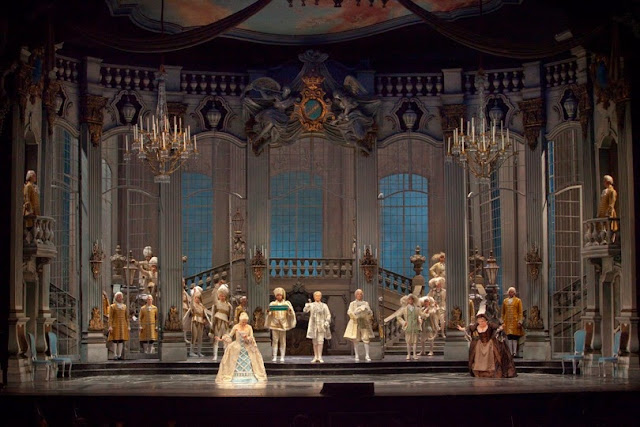
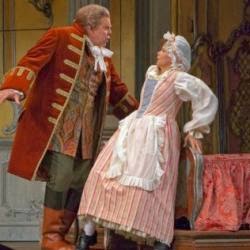
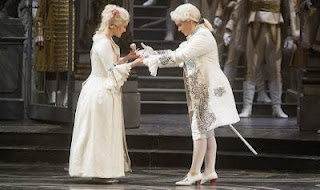

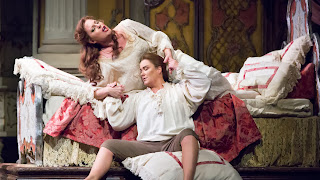
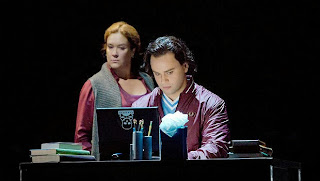
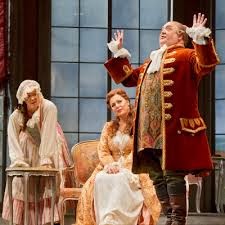


Leave a Reply